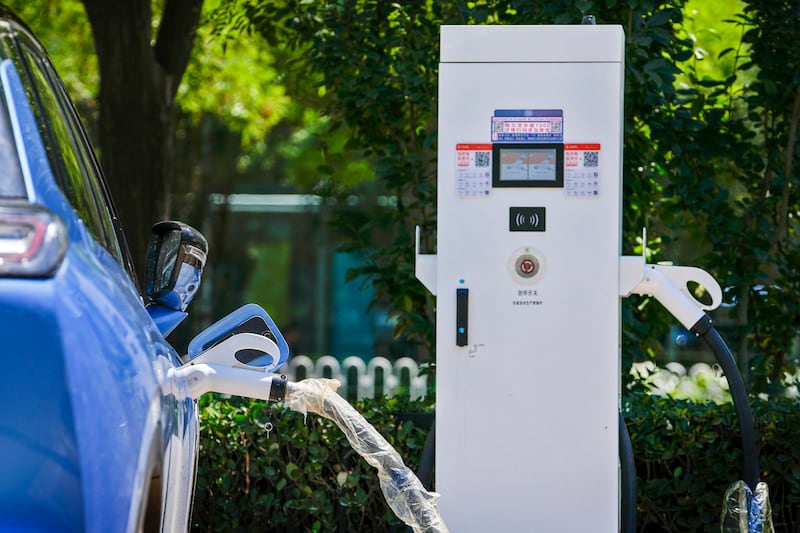[ Read coverage of this topic from RFA’s Mandarin ServiceOpens in new window ]
Fears of spontaneous combustion are driving bans on electric vehicles in parking lots in the eastern Chinese province of Zhejiang, according to recent media reports.
“Hotels and other buildings in Hangzhou, Ningbo, Xiaoshan and other places in Zhejiang have banned electric vehicles from entering underground garages for safety reasons, sparking heated discussions,” citizen journalist X account “Mr Li is not your teacher” wrote in a post on Sept. 9.
One photo showed a notice from management of the Huigang Building in Ningbo city, diverting electric vehicles to a separate parking lot with “wide spaces,” citing safety considerations.
The notices follow a slew of incidents in which fires were reportedly started by various types of electric vehicle, including cars and bikes.
China generally has high product safety standards on paper, but repeated failure to enforce such controls on the ground has sparked widespread mistrust of homegrown products, and a lack of official information often leads to panicked reactions among the public.
The country has recently offered generous subsidies to electric vehicle makers, who have slashed prices to boost domestic demand, prompting U.S. officials to accuse Beijing of allowing persistent "overcapacity" in the sector this year.

According to the Qianjiang Evening News, at least 11 cases of spontaneous combustion were reported in electric vehicles in Hangzhou alone, from April 30 through May 4.
According to reports from China's Huashang Daily and National Business Daily newspapers at the weekend, one five-star hotel in Hangzhou had banned electric vehicles from the basement parking lot, citing recent cases in which they have started fires.
“Based on the characteristics of electric vehicle fires and our hotel’s firefighting capabilities, we think it safer not to allow them into the underground garage,” the papers quoted the hotel’s security manager as saying.
Separate parking
Instead, electric vehicles will be guided to a special parking lot away from the main building, the reports said.
The Metropolis Express newspaper also reported on Sept. 8 that a five-star hotel in Xiaoshan had also implemented a similar ban.
The reports have garnered a number of comments from social media users reporting that they have been turned away from parking lots because they use electric vehicles, which in China can range from e-bikes to mopeds, to cars and vans.
A driver from Zhejiang’s Xiaoshan city who gave only the surname Zhu for fear of reprisals said there had also been a number of fires in the area started by spontaneous combustion in lithium-ion batteries, which are widely used in e-bikes.
“Electric bikes catch fire very quickly,” Zhu said. “We saw a report about one person who took a lithium-ion battery in an elevator and it spontaneously combusted, burning him across 90% of his body.”
Xu Gang, a car mechanic at a repair shop in Hangzhou, said many people are concerned after viewing online videos of fires in electric vehicles.
“We’ve seen so many cases of electric vehicles going up in flames spontaneously, or causing major fires in collisions and accidents,” Xu said. “A lot of basement parking lots are designed with low ceilings, meaning that fire trucks can’t get inside.”
On March 4, a video clip of an electric vehicle spontaneously combusting at a showroom in Hangzhou Auto City went viral on social media.
A similar clip from a roadside in the southwestern province of Sichuan made an impact on social media in June, with the person who filmed the video claiming that people had died in the blaze.
Taiwanese automobile journalist Tseng Yen-hau told RFA in an interview in May that if Chinese-made electric vehicles had a safety flaw, he would expect to see multiple issues reported around the same time.
Translated by Luisetta Mudie.
